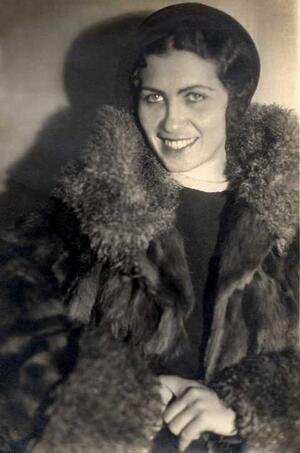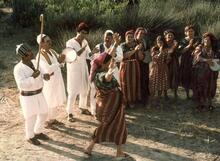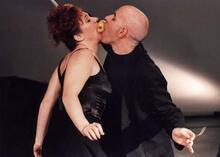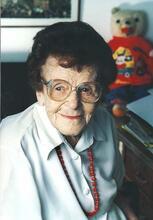Shulamit Bat-Dori
Shulamit Bat-Dori defied notions about the inappropriateness of theater in the kibbutz, creating popular and acclaimed plays for the masses. Bat-Dori was immersed in music, theater, dance, and languages from an early age and began studying at a Warsaw university at age sixteen. Following her Zionist brother, Mordecai Bentov, Bat-Dori joined Ha-Shomer ha-Za’ir and made Aliyah in 1923. She joined Kibbutz B (later Mishmar ha-Emek) and worked as a house plasterer. She traveled to Poland to aid members of Ha-Shomer ha-Zair and studied theater and dance in Berlin, learning to use performance as a vehicle for political statements. After returning to Israel in 1934, she joined the Matate Theater and founded the Kibbutz ha-Arzi Company. From 1965 to 1974 she also taught theater at Tel Aviv University.
Early Life and Family
Shulamit Gutgeld was born in Warsaw on December 7, 1904. Her father, Joseph, son of a wealthy haredi (ultra-Orthodox) family of property owners, had been married off by his parents at the age of sixteen and fathered two children. When he was twenty-one he lost his faith, deserted his family, severed all relations with them, and arrived penniless in Warsaw. There, in 1899, he married Helene, who came from a well-to-do assimilated family. He established a publishing company and the family home became a meeting place for The legal corpus of Jewish laws and observances as prescribed in the Torah and interpreted by rabbinic authorities, beginning with those of the Mishnah and Talmud.halakhah writers. In 1922 Joseph committed suicide. Helene died in Israel in 1958.
Shulamit Bat-Dori, whom everybody called Mita, received an excellent education. Exposed from an early age to classical music, theater, and dance, she was taught German and French by private tutors. She studied at a Polish gymnasium that catered to well-connected families and received her school-leaving certificate. Accepted to the university in Warsaw at the age of sixteen, she studied philosophy and psychology.
Zionist Work and Immigration to Israel
Shulamit Bat-Dori’s older brother Mordecai (Mitek), born in 1900, Hebraized his name to Bentov. One of the founders of Ha-Shomer ha-Za’ir in Poland, he headed its Warsaw branch and for two years also studied law at Warsaw University. In 1920 he emigrated to Palestine, where he continued his law studies at the Mandate School of Law in Jerusalem. He was among the founders of the A voluntary collective community, mainly agricultural, in which there is no private wealth and which is responsible for all the needs of its members and their families.kibbutz ha-Arzi movement and a member of Mishmar ha-Emek. One of the leaders of the Mapam party, he was among the signatories of the Declaration of Independence in 1948 and a member of Lit. "assembly." The 120-member parliament of the State of Israel.Knesset during the first five terms of the legislature. In the third and fourth Knessets he served as minister of development and as Minister of Housing in the sixth. He died in 1985 and is buried at Mishmar ha-Emek.
Under her brother’s influence, Bat-Dori also joined the Warsaw branch of Ha-Shomer ha-Za’ir and began mounting theatrical productions with the participation of its young members. In 1923 she followed her brother to Palestine, arriving at Kibbutz B, later Mishmar ha-Emek, which was at the time located in Nahalal, from which it moved to Afulah.
In Afulah she worked as a house plasterer and also tried her hand at tractor driving. When members of the laborers’ camp asked her to prepare a performance for May 1 she wrote the text in three hours. Appropriately, it was entitled “Bread.” Half of the kibbutz members, forty in number, participated in the enormously successful performance. On the day of the performance, the American writer Waldo Frank (1889–1967) visited the kibbutz, accompanied by a journalist. Both of them attended the performance and were amazed to find so innovative a production “at the end of the world.”
Bat-Dori first met Ya’akov Hazan (1899–1992), later a Mapam leader and member of Knesset, while they were still in Warsaw. When they met again in Palestine they lived together in a “family room” and were soon sent as emissaries to the Ha-Shomer ha-Za’ir movement in Poland. Bat-Dori served as a counselor for the older girls in the movement’s branches and at the same time registered for an advanced course in house plastering. During this period she published a booklet entitled “On the Issue of Young Women in The Land of IsraelErez Israel,” which was a sharp, detailed feminist indictment filled with specific and detailed descriptions.
Dance, Theater, and Writing Career
In 1930 Bat-Dori went to Berlin to study theater, spending her years there learning dance with Rudolf von Laban (1879–1958) and theater with Max Reinhardt (1873–1943) and Erwin Piscator (1893–1966). She also became acquainted with theater for the masses, with its political message, concentrated on it and became a leading practitioner of the genre.
On returning to Palestine in 1934 she changed her name to Bat-Dori and joined the Matate Theater, a small political cabaret, in order to assure herself of her abilities as an actress. Having gained some experience, she returned to the kibbutz, where she initiated and established a kibbutz theater—at the time a strange and unacceptable notion. She fought against the opposition of the members, who in the 1930s perceived agricultural work as its sole vocation. Herself a firm believer in the transformative function of theater, she established it very rapidly, wanting to make it an artistic organ for fulfilling a pronounced political purpose. The first production of the Kibbutz ha-Arzi Company dealt with the problems of the new female/sing.; individual(s) who immigrates to Israel, i.e., "makes aliyah."olim and the performance of When You, A Simple Man, Set Out on Your Way aroused such anger among the right-wing circles in the Jewish community in Palestine prior to the establishment of the State of Israel. "Old Yishuv" refers to the Jewish community prior to 1882; "New Yishuv" to that following 1882.Yishuv that the Mandatory censorship forbade its performance “on grounds of public safety.” Bat-Dori was the first in the country to produce a play by Bertold Brecht, Señora Carrar’s Rifles. This, too, was a play with a political message.
In sum, Bat-Dori brought with her from Berlin innovations unknown in Palestine and in many respects became the outstanding pioneer in stagecraft and the combination of staging and choreography. She herself wrote most of the texts of her performances, suiting them to her own purposes when she produced seasonal harvest plays for kibbutzim, such as My Brethren, Heroes of Glory at Sarid and Givat Brenner, or Till Eulenspiegel at Mishmar ha-Emek. These were mass spectacles, one of which, at the beginning of the 1950s, was attended by ten percent of the country’s population!
Although she was a professional director who had completed studies with the greatest director of the early 1920s, Shulamit Bat-Dori was loath to work in established professional theater. This may have been due to the grand dimensions of her theatrical dreams, which even an especially big stage could not have encompassed, or to her conception of theater as having an active role to play—an entity that could create a kind of communal psychoanalysis by concentrating the efforts of an entire community on a real-life, historical topic with a meaning and a message especially suited to a particular time and place. These elements could not possibly be expressed in conventional theater; the most appropriate arena for them was the kibbutz, which could present the director with the required resources and pool of talent. The fact that she was a kibbutz member throughout her entire life enabled her to specialize in mass productions, with numerous participants, in a specific settlement or community. Her broad education and acquaintance with world culture also influenced her artistic approach, enabling her to perceive her own kibbutz and kibbutz life in general through the wide prism of engagé theater which serves to achieve social and political goals. As for the commercial theater, she found her place in that through the plays she wrote, some of which were performed by the Ohel and Cameri theaters and by Bimat ha-Kibbutz (The Kibbutz Stage). From 1965 to 1974 she lectured in the theater department of Tel Aviv University. When she retired from teaching, at an age at which most artists already rest upon their laurels, she turned to research, studying the artistic phenomenon that had occupied her for most of her life—theater of the masses; in other words, the quantity which converts into a new theatrical quality. All her activities were accompanied by a sense of urgency and importance; there is no other way of comprehending the intensity and scope of her creativity.
In 1939 Bat-Dori married Reuven Ziv. The couple had a son, Yuri (1943–1949) and a daughter, Orna (b. 1945). Yuri’s death at the age of six was a disaster that affected her throughout the rest of her life.
Plays and Legacy
Some of Bat-Dori’s plays were performed abridged, at first because during the 1930s and after the British censored her play The Trial, which dealt with the riots of 1936–1939. It was, however, performed in Berlin in May 1938 by the Kulturbund, the Jewish theater which included within it all the Jewish artists whom the Nazis banned and which performed both Jewish and other works. The Trial was the only contemporary play the company performed.
Among Bat-Dori’s other plays are Stormy Boat, Tractor, Huts and Moon and Sea and Home. Her works were performed in Europe, South Africa and the United States. Works she directed include The Other Woman’s Son, Till Eulenspiegel and My Brethren, Heroes of Glory. Altogether she wrote thirteen plays and directed fifteen. She also published a book of stories, No One Like Her Will Ever Again Blossom (1980).
Shulamit Bat-Dori died in February 1985 and was buried at Mishmar ha-Emek.
Fogiel-Bijaoui, Sylvie and Rachel Sharaby, eds. Dynamics of Gender Borders: Women in Israel’s Cooperative Settlements. Berlin: DeGruyter, 2017.
Ingber, Judith Brin, ed. Seeing Israeli and Jewish Dance. Detroit: Wayne State University Press, 2011.
Kalmar, Ivan Davidson and Derek Jonathan Penslar. Orientalism and the Jews. Waltham, MA: Brandeis University Press, 2004.
Spacs, Ervin. “Israel's ‘Avant-Garde’ Theatre” Jewish Quarterly, 4:4 (1957): 28-29.






